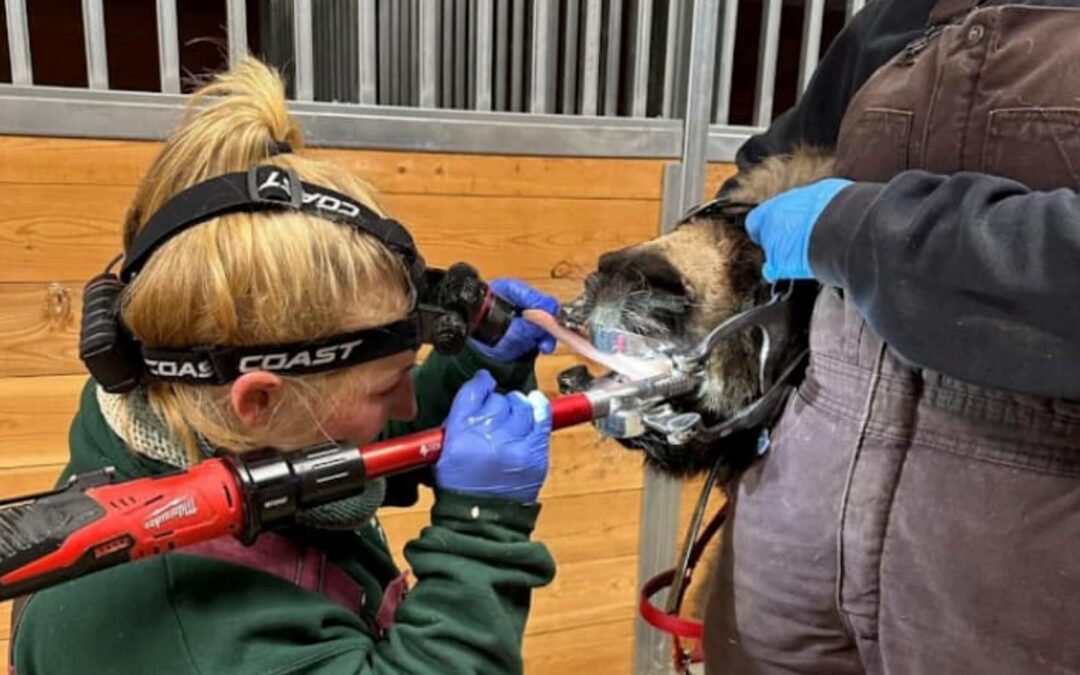January and February are the perfect time to focus on your horse’s dental health! Routine dental care is a cornerstone of maintaining your horse’s comfort, health, and performance. Poor dental health can lead to problems like pain, reduced feed intake, and weight loss, which impact their overall well-being.
To help our clients prioritize equine dental care, we’re offering 20% off dental floats this January and February!
In this article, we’ll discuss equine dentition, common dental issues, and how you can help take care of your horse’s teeth.
Understanding Equine Dentition
Like humans, horses have two sets of teeth over their lifetime.
- Deciduous (Baby) Teeth: These teeth are retained until the horse is about 2.5 years old. At this age, the deciduous teeth begin to fall out and are replaced by permanent teeth.
- Permanent Teeth: Most horses will have a full set of 36-40 adult teeth by the time they are five years old.
What’s in a Horse’s Mouth?
An adult horse’s mouth includes incisors, premolars, and molars, which help them bite, chew, and grind food. Some horses also develop canine teeth, though these are less common in mares.
Common Dental Problems in Horses
Veterinarians commonly treat a variety of dental issues in horses, including:
- Sharp enamel points along cheek teeth
- Tooth wear or fractures
- Tooth abscesses
- Periodontal disease
These conditions not only affect your horse’s dental health but can also lead to:
- Pain while eating
- Dropping feed and losing weight
- Trouble digesting food, leading to undigested particles in manure
- Increased risk of choking or colic
How to Care for Your Horse’s Teeth
The American Association of Equine Practitioners recommends yearly oral exams for horses aged 5-20 as part of their wellness routine. Horses with a history of dental problems may need more frequent care.
During an Oral Exam:
- Your veterinarian will evaluate how your horse’s teeth are wearing.
- Sharp enamel points are filed down with dental floats to prevent irritation.
- Loose, fractured, or infected teeth will be addressed.
If you notice your horse struggling to eat, dropping feed, or showing signs of discomfort, schedule a dental evaluation right away.
January & February Special: 20% Off Dental Floats!
To help you prioritize dental care, we’re offering 20% off dental floats this January and February. Regular floats remove sharp enamel points and keep your horse’s teeth in great condition, preventing pain and long-term health problems.
📞 Call us at 860-459-0986 or visit our Appointment Request Page to schedule your horse’s appointment today.
FAQ: Equine Dental Health
Q: How often should my horse have a dental exam?
A: Most horses aged 5-20 should have an oral exam annually. Younger horses or those with dental problems may need more frequent exams.
Q: What are signs my horse may need dental care?
A: Look for dropping feed, difficulty eating, foul odors from the mouth or nose, facial swelling, or pain when bridled.
Q: What is a dental float?
A: A dental float is a procedure where sharp enamel points on the teeth are filed down to prevent irritation and improve your horse’s comfort.
Q: Why is dental health so important for horses?
A: Dental issues can cause pain, weight loss, difficulty eating, and even lead to serious problems like choking or colic. Routine care helps prevent these issues and supports your horse’s overall health.
Q: Are dental floats covered in the January and February promotion?
A: Yes! We’re offering 20% off dental floats during these months. Farm call charges and other services are not discounted.
Helpful Links
Don’t wait—ensure your horse’s comfort and health with regular dental care. Schedule your appointment today and take advantage of our January-February dental float promotion!
#HealthyHorses #EquineDentalCare #HorseWellness #TriStateVet

